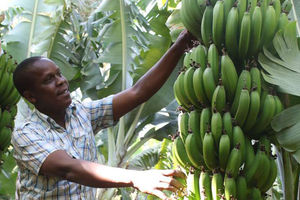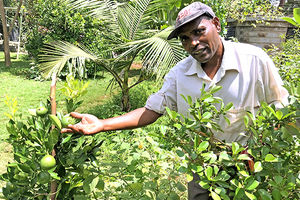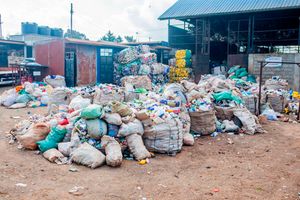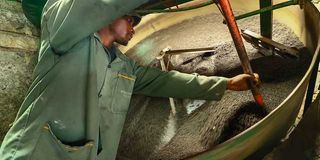
Joseph Venza, a worker at Hygrow Organic fertilizer, granulates fertiliser at the company’s plant in Kiambu County on January 10, 2025.
If there’s a phrase that best describes Richard Mwangi, it’s, “Give me a problem, and I will turn it into an opportunity.”
Mr Mwangi is the founder and CEO of Organic Fields Ltd, a company that specialises in making organic fertiliser from food waste. Located in Kwihota, Ruiru, Kiambu County, the organisation transforms food waste into a valuable commodity for farmers.
The founder's conviction
His journey is one of experience and purpose. Having worked with farmers, especially smallholders, for over a decade, Mwangi has witnessed firsthand the challenges they face. Even as the government works to address food security and hunger, Mwangi believes that tackling poor farming practices should be the first step. Additionally, he sees the widespread use of chemical farm inputs as a significant gap that must be addressed.
“With over 10 years of experience working with farmers, I firmly believe that addressing soil health and improving farming practices should be the top priority to boost agricultural production,” Mwangi says.
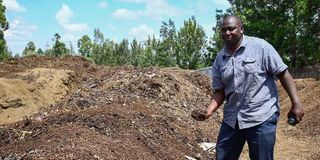
Richard Mwangi, founder of Hygrow Organic Fertiliser, stands on deposits of fertiliser waste at the processing plant in Ruiru Constituency, Kiambu County, on January 10, 2025.
It is this conviction, coupled with concerns about soil degradation and environmental harm, that inspired him to start Organic Fields in 2016. Mwangi’s idea was simple but powerful: processing organic fertiliser from waste.
The concept aligns perfectly with the growing global movement toward organic farming.
Armed with an academic background and experience in Environmental Science and Sustainable Agriculture, the businessman recognised that many smallholder farmers were trapped in poor farming practices. These practices often forced them to rely heavily on chemical fertilisers in the quest for higher yields.
“I used to train farmers on composting, soil health management, mulching, and water conservation, and I can testify to how degraded our soils are,” explains Mwangi, who holds a degree in Environmental Science and a master’s in Sustainable Agriculture.
Organic Fields Ltd officially began operations in 2018. The company was driven by the need to address soil acidity, low farm productivity, and the rising demand for organically produced food. He started small, collecting 200 to 400 kilograms of food waste daily from local markets and turning it into organic fertiliser. Over time, the venture has grown significantly, now producing up to 20 tonnes of fertiliser daily. In addition to food waste, the company collects farm and animal waste.
“We source waste from municipal markets in Kiambu and Nairobi,” Mwangi explains.
The main processing facility is in Ruiru, with additional sites in Tatu City for waste collection and Mwea for producing biochar, a critical component in their fertiliser production. Biochar is particularly lauded for its soil health benefits, including its effectiveness at retaining both water and water-soluble nutrients due to its hygroscopic properties.
“The fertiliser is composted through a controlled system where we introduce microbes, remove smell, and treat it over time before sieving to produce the final product,” explains Juliet Njeru, the Chief Operating Officer (COO) and co-founder.

Joseph Venza, a worker at Hygrow Organic fertilizer, granulates fertiliser at the company’s plant in Kiambu County on January 10, 2025.
The business collaborates with institutions such as Jomo Kenyatta University of Agriculture and Technology (JKUAT), University of Nairobi (UoN), and Egerton University for research and product improvement.
They also work with the Kenya Agricultural and Livestock Research Organization (KALRO), Kenya Bureau of Standards (KEBS), Crop Nutrition Laboratory Services Ltd (Cropnuts), and Kilimohai Organic, which has certified their products for sale across the East African Community for meeting ISO standards. The company uses locally assembled machines, including a granulator, shredder, and sieving machine.
“If we had imported the granulator, it would have cost us millions. By assembling it locally, we have saved money and continue to improve it over time,” Juliet says.
The production process takes two to three months.
Under Hygrow brand, a 10-kilogram bag of fertiliser costs Sh700, a 25-kilogram bag goes for Sh1, 500, and a 50-kilogram bag costs Sh2, 500.
Over the past eight years, Organic Fields has made significant contributions to the agricultural value chain while promoting organic farming.
“We serve clients across the country, mainly smallholder farmers growing coffee, cereals, avocados, mangoes, macadamia, and tea,” explains Mwangi.
In the next six months, the company plans to launch a customised organic fertiliser for avocado farmers which caters to the nutritional needs of the fruit in the soil.
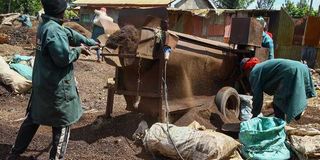
Eco-friendly
“What makes us happiest is improving soil health with eco-friendly materials that would otherwise go to waste,” says the entrepreneur, adding that organic farming is economically viable, and is an effective way to manage farms and address soil health issues caused by climate change.
He also believes that the recently launched Agroecology Strategy by the government will encourage the adoption of organic fertilisers. The 2024–2033 Strategy seeks to address challenges facing agriculture in the country, particularly soil health and the entire food production value chain.
Agroecological approaches use natural processes to optimise interactions between plants, animals, and the environment while integrating local scientific knowledge and social considerations. This ensures the development of sustainable and equitable food systems.
Practices under agroecology include organic agriculture, regenerative technologies, permaculture, ecological soil and water conservation and management, agroforestry, and integrated pest management.
“If the government supports organic fertiliser production, it will reduce pressure on landfills and mitigate greenhouse gas emissions,” he notes, estimating that his business has created over 300 direct and indirect jobs.
Despite its success, the company has faced its fair share of challenges. One is that the numerous licenses required make the business costly to operate. Additionally, being a startup, accessing funds from financial institutions has been difficult.


